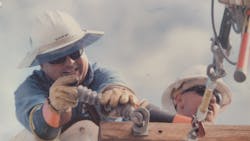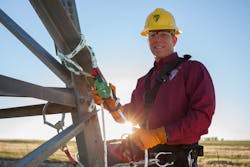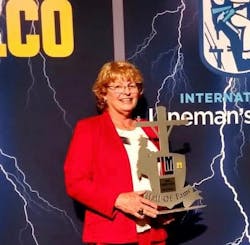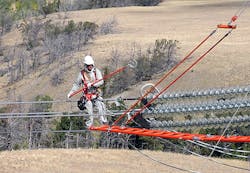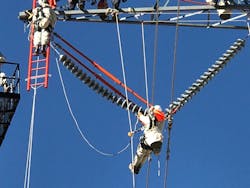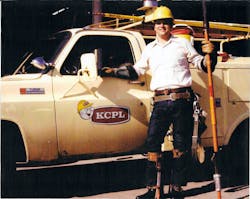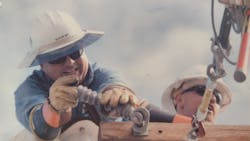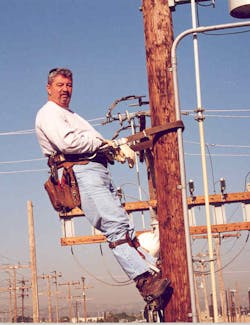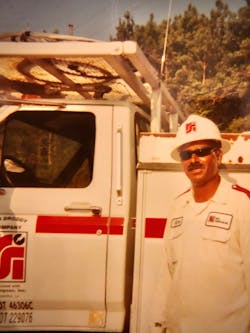Back in 2006, the first members were inducted into the Hall of Fame, and over the last 16 years, the 83 inductees have ranged in ages, backgrounds, geographical locations and walks of life. The honorees are nominated by their friends, family members, coworkers, or supervisors and then selected annually by the Hall of Fame’s board of directors.
Robert Padgett, a board member for the International Lineman’s Museum and Hall of Fame, says the inductees are fine individuals who have done so much for the industry, and it’s a tough decision selecting the annual Hall of Famers. “Some of the best times as a board member is reading all the essays, entry letters and bios of each candidate,” he says. “Some of the worst times is having to vote and choose who will get in and who will not make it for the current year’s inductees.”
For many years, the awardees were honored at the American Public Power Association Rodeo banquet, but last year and again this year, they will be recognized at the International Lineman’s Rodeo banquet in Overland Park, Kansas. In addition, their names are engraved on an 8 ft monument outside the International Lineman’s Museum in Shelby, North Carolina.
To be honored as a Lineman Hall of Famer, Inductee Susan Blaser says it takes dedication, passion, respect and the pride to be able to pass the craft on to the next generation. As the first woman to work at her utility company, she says it was very humbling to be inducted into the Hall of Fame along with the other men and women who have changed the industry. “It’s our duty to be the best, do the best and teach the new generation to be the best they can be,” says Blaser, who is now training future linemen at Metropolitan Community College (MCC) in Kansas City.
Dale Warman, one of the founders of the International Lineman’s Rodeo and Expo, says being a Hall of Famer is all about what a lineman has done for the trade. “It’s not about how good of a lineman you were—it’s about giving something to all the lineworkers and their families,” he says.
Here are the stories of eight recent inductees into the Lineman’s Hall of Fame. Some are still active in the classroom or the field, while others have retired from the trade. Even those who have left the industry, however, are still champions of the trade and are helping to prepare future generations for a career in line work
Mark Groves
Title: President
Training Center: Northwest Lineman College’s Idaho Campus
Location: Meridian, Idaho
Years in the Trade: 26
Memorable Moment: When replacing burnt poles after a firestorm in extreme heat, a pilot dumped water on him and his crew to cool them off
Prior to line work, Mark Groves specialized in concrete and iron work in the Seattle area. Fueled by adrenaline but looking for a way to move past his “feast or famine work life,” he learned about opportunities in the line trade. His newly married wife, Leah, told him about her cousin who went to Northwest Lineman College (NLC) and was hired on a general construction line crew for Pacific Gas & Electric (PG&E).
“The work sounded adventurous and hard,” Groves says. “I needed both in a job that could keep my attention. I enrolled at NLC in 1995, and it was the best decision I could’ve made.”
At NLC, he was trained in linework fundamentals and excelled quickly. “I loved climbing, rigging, transformers, using hot sticks, setting poles and stringing wires,” says Groves, who describes himself as kind, humble, funny, confident, hard-working, adventurous and serious. ”This was seeming to be a great fit. I soon found out that if I could get a lineman apprenticeship in general construction, I would get to work on high voltage, at heights up to 200 ft or more, use four-wheel drive trucks, snowcats, heavy equipment, ride in helicopters and boats in a variety of locations from the cities, trailer parks and hoods to mountains, prairies, farmlands, and coasts.”
The storm work was also a draw for Groves. “Working long hours and occasionally working storms 24-50-plus hours straight without rest—this is the kind of work life I dreamed of,” he says.
During his pre-apprentice training program, Groves remembers hearing stories of camaraderie, resilience, fortitude, occasional tragedy and crazy and comedic adventures with other linemen from Aaron Howell, the founder and former president of NLC. “I was sure this is what I wanted to do and the people who I wanted to be around and like,” he says.
Near the end of his training at NLC, he heard IBEW Local 1245 was hiring groundmen and equipment operators (EOs) for Pacific Gas & Electric (PG&E) general construction crews starting the next day. At the time, he was living in Boise, Idaho, and he and his wife and another NLC student drove all night to arrive in Walnut Creek, California, by 7 a.m. the next day. Weeks later, after setting up meetings with five general foremen, he landed a job working on the line in GC North Bay Area 7, California.
“It was a dream come true,” he says. “I literally wore my first set of Wesco boots out by running with them on the job.”
After being an offered an apprenticeship by Les Hudson, a legendary general construction line general foreman, he launched his career in line work and had his share of memorable storms. In 1996, he worked his first 50-hours straight in the wake of the Lake Tahoe snowstorm. Two years later during the California Coast windstorm, he and the other linemen sank a tower department boat in the San Francisco Bay while on a transmission reconductor. Just days later, the same crew hit 30-plus hours into the shift and hit a pole with their crew truck and replaced their own car-pole that they hit.
“There were certainly many lessons learned on the job about the dangers associated with working long hours,” he says.
His longest shift was during a fire storm in the Cascades in 2005. He worked 70-plus hours straight until his supervisor called him off the mountain and sent him home. “I worked with men of steel on all these storms,” he says. “You can really see what people are made of in extreme conditions.”
As a lineman, he says he has enjoyed many memorable moments. During his career, he developed the OX Block and additional accessories for Buckingham Manufacturing, the NLC TransBanker Training Lab, and NLC EPZ Equipotential Zone Grounder Training Lab. He also was involved with training linemen and apprentices for 20 years, served as the director for the only Washington State Lineman Rodeo and returned to NLC to be an instructor in 2010. He is now the president of the Idaho campus at NLC, which offers entry-level programs, lineman apprenticeships and journeyman level education.
“I want this and the next generation of linemen to be better, safer and smarter than the generation before,” he says. “That’s a big task—the generation prior built what we have, and they are the greatest. In respect of them, we must give our all to do better for the next generation. I’m part of educating this generation and the next, many of them who push themselves will be the safest, smartest, most effective we have ever seen.”
He says he plans to keep working to support the line trade. “I am going to keep doing what I think is the most beneficially impactful to the industry,” he says. “I couldn’t have pulled it off without God and my wife, Leah (crew name, “Squirrel”) who both have always loved me unconditionally and had my best interest.”
He says linemen are the salt of the earth, and the adventures that he heard about from Howell at NLC were all true. “Being a lineman is the best job there is,” he says. “The big jobs, the big storms, developing products and educating linemen have all been great and memorable. The gritty, resilient, hard-working and humorous linemen I got to work with and meet, however, shaped the lineman who I am.”
Before he got into line work, Mark Groves specialized in concrete and iron work in the Seattle area. Fueled by adrenaline but looking for a way to move past his “feast or famine work life,” he learned about opportunities in the line trade.
At that time, he was newly married, and his wife, Leah, told him about her cousin who went to Northwest Lineman College (NLC) and was hired on a general construction line crew for Pacific Gas & Electric (PG&E). “The work sounded adventurous and hard,” he says. “I needed both in a job that could keep my attention. I enrolled at NLC in 1995, and it was the best decision I could’ve made.”
At NLC, he was trained in linework fundamentals and exceled quickly. “I loved climbing, rigging transformers, using hot sticks, setting poles and stringing wires,” says Groves, who describes himself as kind, humble, funny, confident, hard-working, adventurous and serious.” This was seeming to be a great fit. I soon found out that if I could get a lineman apprenticeship in general construction, I would get to work on high voltage, at heights up to 200 ft or more, use four-wheel drive trucks, snowcats and heavy equipment, ride in helicopters and boats in a variety of locations from the cities, trailer parks and hoods to mountains, prairies, farmlands and coasts.”
The storm work was also a draw for Groves. “Working long hours and occasionally work storms 24-50-plus hours straight without rest—this is the kind of work life I dreamed of,” he says.
During his training program, Groves remembers hearing stories of camaraderie, resilience, fortitude, occasional tragedy and crazy and comedic adventures with other linemen from Aaron Howell, the founder and former president of NLC. “I was sure this is what I wanted to do and the people who I wanted to be around and like,” he says.
Near the end of his training at NLC, he heard IBEW Local 1245 was hiring groundmen and EOs for Pacific Gas & Electric (PG&E) general construction crews starting the next day. At the time, he was living in Boise, Idaho, and he and his wife and another NLC student drove all night to arrive in Walnut Creek, California, by 7 a.m. the next day. After setting up meetings with five general foremen, he landed a job working on the line in Santa Rosa, California.
“It was a dream come true,” he says. “I literally wore my first set of Wesco boots out by working and running with them on the job.”
After being an offered an apprenticeship by Les Hudson, his general foreman, he launched his career in line work and had his share of memorable storms. In 1996, he worked 50-hours straight in the wake of the Lake Tahoe snowstorm. Two years later during the California Coast windstorm, he and the other linemen sank a tower department boat and replaced their own car-pole that they hit within the same week. During a fire storm in the Cascades in 2005, he worked 70-hours straight until his supervisor drove up the mountain and took him home.
“I worked with men of steel on all these storms,” he says. “You can really see what people are made of in extreme conditions.”
As a lineman, he says he has enjoyed many memorable moments. During his career, he developed the OX Block and additional accessories for Buckingham Manufacturing and the TransBanker Training Lab and EPZ Grounder Training Lab. He also was involved with training linemen and apprentices for 20 years and served the director of the Washington State Lineman Rodeo. He is now the president of the Idaho campus of Northwest Lineman College (NLC), which offers entry-level programs, lineman apprenticeships and journeyman level training.
“I want this and the next generation of linemen to be better, safer and smarter than the generation before,” he says. “That’s a big task—the generation prior built what we have, and they are the greatest. In respect of them, we must give our all to do better for the next generation. I’m training this generation and the next, many of them who push themselves will be the safest, smartest, most effective we have ever seen.”
He says he is going to keep doing what he thinks can be the most beneficially impactful to the industry. “There are seasons in our lives—I believe you need to recognize them and know where you are, and that consciousness will tell you what to do next. I couldn’t have pulled it off without my wife, Leah (crew name, “Squirrel”) who has always loved me unconditionally and had my best interest.”
He says linemen are the salt of the earth, and the adventures that he heard from Howell at NLC about were all true. “The big jobs, the big storms, and developing products for linemen were all great and memorable,” he says. “The gritty, resilient, hard-working and humorous linemen I got to work with and meet, however, shaped the lineman who I am.”
Susan Blaser
Title: Lineman Program Coordinator
Metropolitan Community College
Location: Province, Missouri
Years in the Trade: 33
Memorable Moments: Dying her glove bags pink, wearing a cowboy hard hat, topping out as a journeyman lineman and climbing with her daughter.
Susan Blaser says she didn’t go into line trade for pride or glory—she went in to support her family. “I knew I wanted to be able to support my children and give them a good life,” she says. “This set the scene for three-and-a-half years that I would spend earning that journeyman lineman title—something no other women had successfully done at our company or in the state of Missouri.”
Blaser’s career path led her from a meter reader to an apprenticeship at Kansas City Power & Light (now Evergy). Over her more than three decades in the trade, she has won the Governor’s award for Excellence in Teaching for the lineman training program at MCC and was inducted into the International Lineman’s Hall of Fame. She has also had the opportunity to watch her daughter become a journeyman lineman and mentored and trained women how to climb in her backyard.
“I have supported the craft and mentored men and women to be successful,” she says. “I'm actively looking for women who want to become part of the sisterhood. I believe in the equity necessary for women and diverse candidates to succeed in this field, and I am a champion for this cause. I want to open the door of opportunity for everyone.”
Blaser has been called a trailblazer, a pioneer and a leader for others to follow. “Those titles are nice and have made me feel like what I had done somehow mattered,” she says. “However, over the last few years as social media has connected so many women and opened the conversations about what it takes to reach that journeyman status, I have decided that I was never a trailblazer, pioneer or leader—I was a warrior. I fought for every minute, hour and day of my apprenticeship. Nothing was ‘given’ to me—it had to earned and taken.”
It’s time to add women and more of the underrepresented population into the craft, she says. “Women are 50.52 percent of the population, but you don’t see them in line work—and people of color even less,” she says. “This is a great career, and everyone deserves a chance to be successful. The experience is walking away and retiring. It’s our responsibility to bring in the next generation based on desire and not the color of their skin or gender.”
As the lineman program coordinator for MCC, Blaser says she is excited to move into the new training center and for the students’ experiences in the program. The students have class three days a week and spend 85 percent of time outside on the poles. “We focus on safety, retention and construction and how to be the second set of eyes on the pole and keep your brother or sister safe,” she says. “We teach those work habits that will carry you through your career with no accidents.”
In the future, she says there needs to be a sense of urgency to replace and train linemen who are leaving. “Bringing in safe, qualified candidates who have proven themselves through a line school is not just filling a spot, but setting that person up for success,” she says. “Students who finish these programs are prepared, and they know what to expect. They took the time to learn the craft and are prepared to hit the ground running when given the opportunity—isn’t that what we all look for when hiring?”
The lineman program is her passion, and she can’t think of anywhere else she would like to work. She also enjoys using social media and podcasts to find women to offer support, encouragement and mentoring to enter the trade world. With her daughter in the line trade, she urges linemen to support the future workforce in the industry.
“It takes an intolerant person to be negative, jealous, and dismissive to try to run others from the trade or judging those before knowing their story,” she says. “It takes a great person to train, share their knowledge, support, mentor, accept and support those that choose this path. Be a great person. You're training my children and grandchildren.”
George Gaudet
Retired
Location: Billings, Montana
Years in the Trade: 49
Memorable Moments: Observing the growth and development of learners from the first day of an orientation class to program completion and earning the Journeyman classification.
George Gaudet’s father worked as an operator of hydro and steam generation plants. When he visited these facilities, he was intrigued by power generation and knew he would become part of the electrical industry. “At an early age, I was told by my dad that the electrical industry is in its infancy,” Gaudet says. The increases in voltages, conductor and equipment sizes, and modern technology proves he was correct in his prediction. Smart grid development and implementation is the next step in the progressive realization of a superior 21st century national system.”
To ensure reliability and provide for future growth, he says the “dated” national grid is in need or a complete rebuild. “The latest generations of linemen will supply the essential knowledge and skills to successfully complete this monumental challenge,” he says.
When he learned that the line construction Joint Apprenticeship Training Committee was seeking applicants, he applied, was interviewed, then indentured in 1973. Upon completion of this Mountain States Line Constructors JATC Program, he earned the journeyman lineman classification. “Being in the employ of both utilities and construction companies, I gained a wide variety of experiences,” he says. “These ranged from constructing, maintaining, and troubleshooting distribution and transmission lines to live-line hot sticking and barehand work on 500 kV systems.”
In 2005, he took the position as assistant director for the Mountain States Line Constructors. “Being a classroom instructor, trainer and mentor for line apprentices brought a level of gratification that made all other accomplishments pale in comparison,” he says.
While at Mountain States JATC, he developed transformer studies, circuit analysis, excavation safety, rigging and training programs, which are now part of the core curriculum. He has also served as a member of the National JATC’s education committee since 2005. Although now retired, he continues to assist the Curriculum Development Committee in creating training materials. The national program’s online training contains reference information sheets he has written and illustrated.
In his role today, he continues assisting the National JATC in curriculum development. His current project is assisting a publisher in writing and illustrating a two-volume textbook set on distribution transformers. The study will cover theory, transformer installation, bank hookups and safety procedures. On completion, these books will be issued to second- and third- year apprentices on a national level. He is flattered and honored to be nominated for the Hall of Fame by his one-time pole partner, co-instructor, and area JATC program director.
“Being retired I look back at my life in the line industry with fond memories,” he says. “It's been a hell of a ride.”
Jim McDonald
Title: Owner
Company: Powerline Training Consultants
Location: Grimsby, Ontario, Canada
Years in the Industry: 50
Memorable Moment: Traveling the world conducting live-line training and passing on this skill set to others.
Jim McDonald had a summer job installing traffic signals when he noticed a line crew working nearby to change out poles. “I thought it looked like a great job, and I wanted to get into it,” he says. “It was outdoors, and this is where I wanted to work.”
After completing a boot camp at Ontario Hydro, he was assigned to Georgia Bay region to begin his apprenticeship. Over the years, he has worked many storms, but one experience he will never forget. “I was on call with another lineman, and we had stopped to get something to eat,” he says. “Thirty minutes later, we walked out into a totally blinding blizzard, and the call started. We ran out of fuel after a long night, and there was no power anywhere. We found our way to a farm, where the family took us in. It was three days before the company located us once the storm finished.”
Beyond working as a journeyman lineman, he was also hired by A.B. Chance Company as a live line specialist. I had the opportunity of a lifetime where I traveled the world for 20 years,” he says. “I worked in many countries doing what I love and passed it on to others while making many friends.”
He also developed a complete live-line training program and training center for a large IOU in Canada. In 1993, he started his own training and consulting business, and he introduced live-line barehand rope access to utilities in North America. In addition, he developed live-line programs and training for the industry and wrote 20 manuals for the power line field. He is now in Syracuse, New York, conducting barehand training, and he plans to retire on Dec. 31.
“My career is winding down now, and it’s time to spend time with my wife of 35 years with whom I have been away from on an average of 40 weeks per year since I started my business,” he says. “I want to enjoy life with my wife and take her to many of the places and countries I have traveled to. I also plan on visiting with all the special friends I have met over the years.”
He says if he could go back in time, he would still choose the line trade as a career. “This is the greatest career I could have imagined, and I am very thankful to have been a part of it,” he says. “I never in my wildest dreams could have imagined this honor of being in the Lineman Hall of Fame for myself as all I have tried to do is improve things and pass on knowledge and skills.
“I have absolute respect for all those who I have worked with throughout my career and have helped or passed on their knowledge to make me the person I am,” he says.
Dale Warman
Company: Retired from Kansas City Power & Light (now Evergy)
Location: Leawood, Kansas
Years in Industry: 42 before he retired
Memorable Moment: Working beside some of the best people he’s ever known
After getting discharged from the U.S. Navy, Dale Warman needed a job. His high school friend, who was a lineman, told him to go to Kansas City Power & Light (KCP&L, now Evergy), where he was hired as a laborer. “I had no idea what a lineman did, so that wasn’t on my radar,” he says. “I will always believe that this is what God planned for me, and it’s been a great life. I have no regrets.”
As a lineman, he remembers flying on a chartered plane and working off rented trucks following a blizzard in Birmingham, Alabama. “Storm restoration was exciting and challenging as you feel like you’re serving the community in times of need,” he says.
Warman, who actively volunteers for not-for-profit organizations in the Kansas City, area, not only enjoyed working as a lineman, but also serving as one of the founders of the International Lineman’s Rodeo and Expo. “I worked with others to develop the Rodeo as you see it today,” he says. “I’m retired, and I am still involved with the Rodeo as the CEO, and I feel like I share the honor of being in the Hall of Fame with the board and volunteers of the International Lineman’s Rodeo.”
Dennis Kerr, a co-chairman of the International Lineman’s Rodeo Association, says he remembers Warman’s influential role in launching the International Lineman’s Rodeo 38 years ago. “In in the very beginning, there were many scrambling times to get food, awards and enough volunteers to make it an interesting event for the linemen,” he says. “His family has been so much a part of this organization—always helping and volunteering to help in any way they could.”
In September 1984, 12 participating teams from Kansas and Missouri competed in the very first Lineman’s Rodeo. Today, more than 200 teams and 300 apprentices compete at the event at the Agriculture Hall of Fame grounds in Bonner Springs, Kansas. Over the years, Warman has promoted the Rodeo to local community organizations and worked to recruit a solid group of volunteers, Kerr says.
“He is a true leader of this organization with all of his many contacts as well as the many boards he sits on,” he says.
With his dad and uncle spending their entire years in construction, Warman thinks that if he was not a lineman, he would have been involved in the construction world.
Warman says he has enjoyed working in the line trade and plans to help with the International Lineman’s Rodeo and Expo as long as he is able to. Kerr says Warman is a fantastic choice in the International Lineman’s Hall of Fame because all his efforts have helped to promote the lineman trade.
“He is so critical to the organization with all his contacts to move our event forward,” Kerr says.
Anthony Sylvers
Company: Los Angeles Trade-Technical College
Location: Simi Valley, California
Years in Industry: 35
Memorable Moments: Meeting other friends and family at Lineman’s Rodeos
Anthony “Ant” Sylvers thought about one day working as a firefighter, but during a trip down to Glendale City Hall in California, he learned about an open position as an electrical helper with the City of Glendale. Seven months later, he entered the apprenticeship program for an electrical mechanic apprentice, and three-and-a-half months later, he topped out as a journeyman in the underground at the age of 26. He later cross trained as an apprentice in the overhead program, and then became an electrical line mechanic and a supervisor in charge of safety and training.
“The highlights are having fun, working outdoors, meeting all kinds of people, and helping others get a career in the utility business,” he says. “All the storms were rough, but the best thing with most of the heat or winter storms was that it was always great to hear the customers say, ‘Thank you very much,’” he says.
Later in his career, the Verdugo Power Academy, through Glendale College, invited him to help students get into the power industry. He then retired with the City of Glendale to teach students at Los Angeles Trade Technical College. As an instructor, he teaches students how to climb utility poles and earn their 600-hour climbing certificate. He says he is stubborn and teaches his students the old-school way.
“My students would tell you the same thing, but they always come back and say ‘you were right about the industry—thank you for getting us ready,’” he says.
Sylvers says it was a great feeling to be a Hall of Famer. He says those who have been inducted give back to the utility and help others to succeed in the utility business. “I never thought I would be inducted into the Hall of Fame, and I had great mentors that helped to get me there,” he says. “Thank you goes to Randy States, Ramon Abueg, Tim Kutas and Lino Torres. It’s been a great career, so I’m so happy this opportunity came my way. I would never change how it turned out.”
Patrick Lavin
Retired from the IBEW
Location: Diamond Bar, California
Years in Industry: 56
Memorable Moment: Going home every night intact without a serious injury
In June 1966, Patrick Lavin’s father woke him up and announced he was going to work with him. He took him down to IBEW Local 9 in Chicago and got him cleared as a grunt. When he enlisted in the U.S. Marines Corp. three years later, he was an IBEW member, and he’s been one ever since. “My journeyman lineman ticket is still active, even though I’m retired, so that’s been 56 years,” he says.
He interviewed with Southern California Edison (SCE) in 1982 while on vacation, and two years later, they offered him a job in Santa Ana, California. Over his career, he has worked in seven states for numerous IBEW signatory contractors and four utilities—the Tennessee Valley Authority, SCE and the cities of Azusa and Anaheim, California, working on transmission, distribution and substation facilities in overhead and underground applications. He has worked in construction and maintenance positions as a lineman, troubleman, foreman and general foreman. He was elected four times as IBEW’s 7th district IEC member covering 10 western states at international conventions. In 2016, his two sons nominated him for the convention, which was a memorable experience, he says.
Lavin was elected as business manager of IBEW Local 47 in Southern California for eight terms, and he grew Local #47 from 4500 members in 1999 to about 14,000 in 2021. His daughter, Katie, nominated him as a business manager and financial secretary to his last term in 2020. “I hand created various policies at the Local that are still in effect and working today,” he says.
Over the years, he has worked many different storms—from the ice storm in March and April of 1978 in southern Illinois to the El Niño rainstorm in Santa Barbara and Ventura, California, and heat storms in Southern California. He is now enjoying retirement after a lifelong career with the IBEW. “The opportunities are endless, but the biggest challenge is staying safe,” Lavin says. “I look forward to continuing a long and healthy retirement and staying involved and consulting for the Local and employers. I’m grateful and humbled to be in the Hall of Fame, and it’s a great honor.”
Clifton Droddy Jr.
Years in Industry: 46 years in the trade before he passed away in 2018
Memorable Moment: Traveling the country with his dad and brothers to do line work
Clifton Droddy Jr., also known as “Bub,” grew up in line work. At the age of 15, he started out in the trade by working summers with his father. He, his dad and two brothers built transmission lines all over the country and also moved into overhead distribution. When he died at the age of 61, he had 46 years as a lineman and a foreman.
Caryn Cross Droddy was married to Clifton for 38 years, and they had three children together. She says her late husband, like many linemen, put their lives on the line to keep the power flowing. “He saw tragic things happen on the line and sacrificed basic comfort and time with us during storms to make sure people got power back,” he says. “He told me many times that he wished he had a dollar for every mile of line he built and repaired across America because he would be rich.”
For most of his career, she says their family traveled the country with his line work. “His Dad was in it, and he and his two brothers worked together their whole lives until Clifton’s death in 2018,” he says. “I was always told he was one of the best in the country. It was easy to believe because he was the hardest working man you would ever meet. He was serious, firm and always wanted to make sure a job got done.”
In his free time, she remembers his love for hunting hogs, and described him as the toughest man. “He caught the boars with his bare hands, tied up their feet and brought them home,” she says. “We owned cows, and he would rather wrangle a rough cow than try to rope her. That’s what he could do best. When we first met, to impress me, he would put out the flame of a candle in a glass by keeping his hand over it until it went out.”
His family, friends and coworkers at Volt Power, LLC, nominated him for the Lineman Hall of Fame, and in the nomination letter, they said that being a lineman was the epitome of his life. “He learned the line trade, and then used his knowledge and skill set to build lines and train deserving under-classmen wherever he needed to go,” the letter stated. “If you were willing to work hard and listen, he was willing to teach you. Building power lines was the only job Clifton every had, and he was very knowledgeable on all aspects of the work, including distribution, transmission and URD lines.
In his job at Volt Power LLC, his coworkers said he showed leadership and focused on doing jobs safely and delegating tasks so everyone knew what to do. “He could outdo most people around him in his later years, but he would never boast about what he could do or accomplish,” the letter continued. “He was generous to those he felt were good people, and he was a mentor and leader to those around him.”
Because of his care for his fellow linemen, friends and family, he was nominated and honored in the Hall of Fame. “He led by example and made sure he passed along his extensive line knowledge to others,” stated the nominators. “His many stories and his ability to bring out the best in those around him will continue with us for years to come and still inspire future linemen to this day.”
Editor’s Note: To learn more about the nomination process for the Lineman Hall of Fame and to read about all the inductees from 2006 to present day, visit www.linemanmuseum.org/hall-of-fame.
Amy Fischbach (amyfischbach@gmail,com) is the field editor for T&D World magazine.
Words of Wisdom for Linemen
After working decades in the line trade, the Hall of Famers have a piece of advice or two to share with linemen to stay safe and productive out in the field. Here are some of their tips for today’s field workforce.
- Stop being distracted. Anthony Sylvers urges linemen to get off their cell phones, get over their attitudes, stop thinking about the money and focus on the job.
- Don’t fall for mediocrity. Mark Groves says linemen should be the best version of themselves and not let others set their benchmark.
- Learn about new technology. In the future, Groves sees linemen having the opportunity to branch off into special technical areas—from power to cellular to fiber and phone. “Great training and the opportunity is the only limiting factors,” he says. “Many linemen are doing all these things and probably a few more depending on where they are.”
- Adapt to change. Dale Warman says line work has changed a lot in his lifetime, and it will continue to change. “I don’t think anyone knows as sources of power change as well as the way it is delivered, but one thing is for certain—it will be changing.”
About the Author
Amy Fischbach
Electric Utilities Operations
Amy Fischbach is the Field Editor for T&D World magazine and manages the Electric Utility Operations section. She is the host of the Line Life Podcast, which celebrates the grit, courage and inspirational teamwork of the line trade. She also works on the annual Lineworker Supplement and the Vegetation Management Supplement as well as the Lineman Life and Lineman's Rodeo News enewsletters. Amy also covers events such as the Trees & Utilities conference and the International Lineman's Rodeo. She is the past president of the ASBPE Educational Foundation and ASBPE and earned her bachelor's and master's degrees in journalism from Kansas State University. She can be reached at [email protected].
